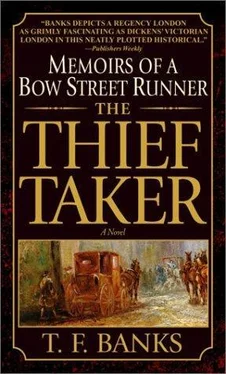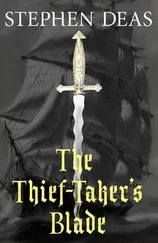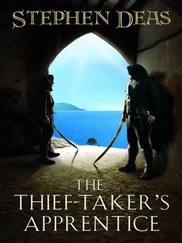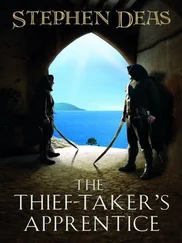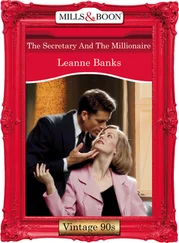T.F. Banks - The Thief-Taker
Здесь есть возможность читать онлайн «T.F. Banks - The Thief-Taker» весь текст электронной книги совершенно бесплатно (целиком полную версию без сокращений). В некоторых случаях можно слушать аудио, скачать через торрент в формате fb2 и присутствует краткое содержание. Жанр: Исторический детектив, на английском языке. Описание произведения, (предисловие) а так же отзывы посетителей доступны на портале библиотеки ЛибКат.
- Название:The Thief-Taker
- Автор:
- Жанр:
- Год:неизвестен
- ISBN:нет данных
- Рейтинг книги:5 / 5. Голосов: 1
-
Избранное:Добавить в избранное
- Отзывы:
-
Ваша оценка:
- 100
- 1
- 2
- 3
- 4
- 5
The Thief-Taker: краткое содержание, описание и аннотация
Предлагаем к чтению аннотацию, описание, краткое содержание или предисловие (зависит от того, что написал сам автор книги «The Thief-Taker»). Если вы не нашли необходимую информацию о книге — напишите в комментариях, мы постараемся отыскать её.
The Thief-Taker — читать онлайн бесплатно полную книгу (весь текст) целиком
Ниже представлен текст книги, разбитый по страницам. Система сохранения места последней прочитанной страницы, позволяет с удобством читать онлайн бесплатно книгу «The Thief-Taker», без необходимости каждый раз заново искать на чём Вы остановились. Поставьте закладку, и сможете в любой момент перейти на страницу, на которой закончили чтение.
Интервал:
Закладка:
The small face vanished back into its obscurity and then, moments later, a miniature female figure emerged from behind the wall quite on the far side of the bar. There must, Morton saw, be some connecting passage joining the two places, perhaps only large enough for a child to slip through.
For a child was the owner of the face he had glimpsed, and who now dutifully approached his table, bearing his dram carefully in two hands. Dressed in an utterly filthy dun-coloured scrap of robe, her dust-grey hair chopped short and sticking out in tufts around her head, she looked to be nine or ten years of age. But Morton knew how deceiving such appearances could be, here where a lifetime's knowledge of good and evil could be compressed into a year or two, and where human beings matured quickly, or not at all. The girl set the clouded glass down cautiously before him, and then made an odd awkward dip, a kind of hurried curtsey. Dark, curious eyes looked up at him, set in sharp, strangely knowing features. Then she wheeled and was gone in a little rush back into the gloom beyond the bar.
As his glance followed her, he caught sight of others. Partway up the wooden staircase, three little crouching forms, three more female faces, peering down at him. The instant he noticed them, they scrambled silently upward out of sight.
Henry Morton drew a heavy breath, and drank down half his glass in one swallow. He made a peremptory gesture to the keep, calling him over to the table.
“So,” Morton addressed him in the language of the streets, “this be a nanny-house?” And he inclined his head toward the stairwell.
“It may be. You hanker for a bit of a curtezan, do you? A little kinchin-mort?”
Morton could hardly contain a grimace. “Courtesans” seemed rather a grotesque term for the pitiful little females he had glimpsed on the stairs.
Before he could put another query, however, a new voice spoke, clear and deliberate.
“Guard yerself, Joshua. He's a horney.”
Morton twisted round in anger. It was one of the two men at the other table, the larger, burlier one, who gave him one hard, defiant stare, then looked down again.
“We've a lawful public, here,” the barman protested, backing away. “Drink yer swig and leave us be.” It was true enough. Morton knew that formal justice was largely powerless to stop the overt business of a house like this. The only charge that could even be laid was that of creating a “common nuisance,” and with no one working the sidewalk outside the house, this would be impossible to sustain. But there were other pressures that could be applied.
“Come back here,” he ordered the man, dropping the pretence of being an ordinary customer. “I've some questions for you, and you'll answer them smart if you want to continue vending drink in this parish.”
The tapster edged back, reluctantly. Only a tiny percentage of the tens of thousands of public houses in London actually possessed the required licence. But if an officer suddenly insisted on one, he could, at least for a time, make some misery for a place.
“Last night you'd another gentleman in here,” Morton told him, watching him closely as he spoke. “He was well dressed, in black pantaloons and a dark green coat. He left in a hackney-coach, somewhere around the hour of ten.”
Joshua mumbled something to the effect that he'd served plenty of customers yesterday, and how was he to remember-
“He drank more than was good for him,” Morton interrupted, “and someone from this house helped him into his coach.” Joshua's rheumy eyes flickered over to the other table, to the man who had warned him that Morton was police. The other man stared back impassively now, saying nothing. His companion gazed off as if distracted.
“Plenty of coves as drink too much,” said Joshua.
“Yes, but this man stood out. You don't get his sort often-very finely dressed, like a dandy. I've no doubt you remember him.”
Another flicker of the eyes in the direction of the other table. At the other table, the same impassive stare.
“I don't recollect him. But I haven't always been here, have I?”
“He left by hackney-coach. The driver took him from your very door.” Morton decided to bluff. “He said one of the men who helped him into the coach was the publican.”
He watched the man's eyes, which slid away toward the others. “I don't recollect such a man.”
Morton turned in irritation to the second table.
“What about you two? Did you see the gentleman?”
“We wasn't here yesternight,” responded the burly man.
“No, I'm sure no one was here,” Morton muttered. “And why would that be, I wonder?”
He did not offer to pay for his brandy as he stood, and the keep did not make any effort to remind him of it. For an officer of police to pay for something at a flash house would be to grant it a degree of legitimacy, and neither Morton nor any of his brother officers ever did. An honest house was quite another matter.
“If I were a cully, like some I see here tonight,” he announced generally, “I'd give some serious consideration to my liberty and my livelihood, and to what I might be able to do to help the officers charged to keep His Majesty's peace. I'd take some time, for example, to think over what passed here yesternight, so that I could tell them next time they asked. Because they'll be back to ask again, sure.”
“This here's a lawful house,” objected Joshua. “And Bow Street knows it, even if you don't.”
“I am Bow Street,” said Morton.
To this Joshua grunted unintelligibly and the men at the second table both looked mutely down into their mugs again.
Well, he could get no more from them. He gave his hat a brief, contemptuous brush with one hand, as if to rid it of the contagion of their presence, and went out.
Chapter 10
Morton was restless after his visit to the troubling streets of Spitalfields, and had consequently not been in his bed nearly as long as he might have liked when Wilkes woke him to announce that Miss Hamilton's maid Nan was waiting to speak with him.
“Damnation,” the Runner mumbled emptily, and swung his feet over the side of his bed. Wilkes had at least thought to accompany these tidings with a hot bowl of cafe au lait- many of Morton's tastes in the pleasures of life were defiantly Gallic-so while he sipped he asked:
“Did she say anything interesting last night, this abigail?” Morton assumed that Wilkes had entertained the servant in the kitchen while he'd talked to her mistress.
“She is discretion dressed and walking, our Nan,” replied Wilkes. “Actually, sir, she made it rather clear that any man who served a mere police constable was beneath her notice. She was not about to tell me anything.”
“Well, I wonder what hope I have. Being the mere police constable himself.”
A few minutes later Wilkes ushered the visitor into the parlour. Morton very politely saw her to a chair, offering refreshment as he did. His attentions were received with minimal courtesy, and a barely civil refusal to taste his food or drink.
Nan was a slim woman of middle years with a sharp, long-nosed, narrow countenance. She was well dressed in an Indian muslin day dress, over which was artfully arranged a silken blue pelisse and cape with, of course, the proper black mourning ribbons. Morton guessed that such clothes had been passed on to her by Miss Hamilton, so perhaps they really were as close as sisters. At any rate, her manner certainly suggested she viewed herself more as a gentlewoman than a servant.
She perched on her seat as if unwilling to make herself comfortable and peered back at Morton with the kind of suspicious air he knew only too well. From top to bottom of British society the very idea of a police was distrusted and resented. He half expected to be treated to the usual speech about the liberties of free-born Englishmen. Instead, she said: “I am to give you this.” She passed him a neatly folded paper. Morton opened and ran his eye over it quickly, just long enough to pick out the reference to Two Hundred Pounds Sterling, then casually set the bank draught aside. God knew, the Runners were suspected of greed enough as it was. Nan's palpable disapproval of her mistress's proceeding burned like a hearth before him.
Читать дальшеИнтервал:
Закладка:
Похожие книги на «The Thief-Taker»
Представляем Вашему вниманию похожие книги на «The Thief-Taker» списком для выбора. Мы отобрали схожую по названию и смыслу литературу в надежде предоставить читателям больше вариантов отыскать новые, интересные, ещё непрочитанные произведения.
Обсуждение, отзывы о книге «The Thief-Taker» и просто собственные мнения читателей. Оставьте ваши комментарии, напишите, что Вы думаете о произведении, его смысле или главных героях. Укажите что конкретно понравилось, а что нет, и почему Вы так считаете.
